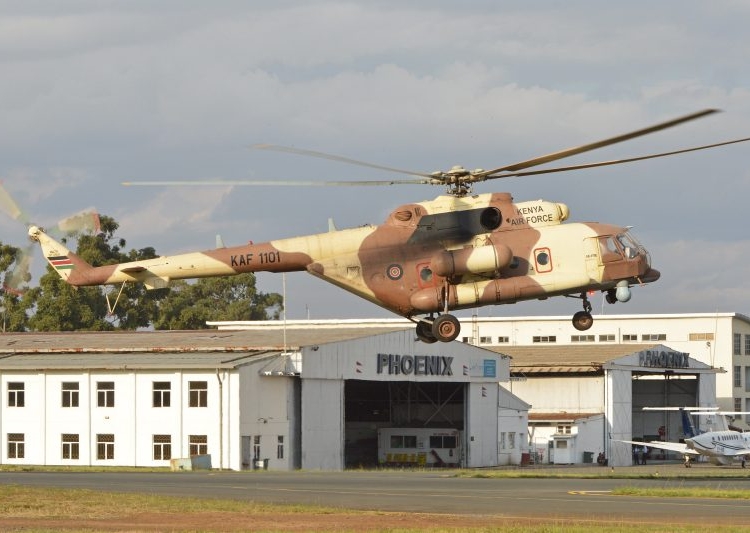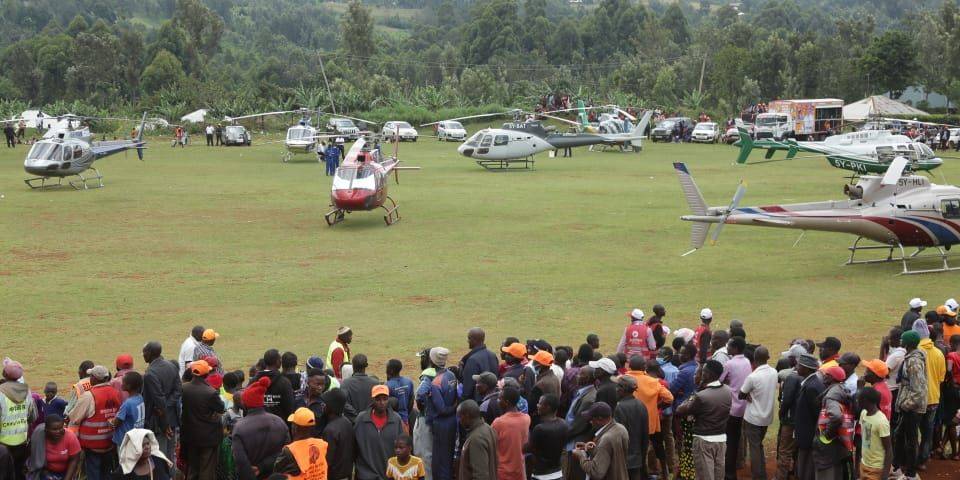Investigations
State Chopper Deals Raise Eyebrows as One Firm Bags 90% of Government Contracts

The skies over Kenya’s procurement system are stormy again. A private aviation firm with strong ties to the Kenya Airports Authority (KAA) has quietly scooped nearly all helicopter hire contracts in recent years—raking in millions.
The firm, Pro Flight Limited, is owned by retired Kenya Air Force officer Liltasayon Neepe, who also sits on the KAA board. A watchdog probe is now underway.
What should have been a competitive, transparent process appears heavily tilted in favor of one company.
With Sh31.5 million in contracts over just three years, the State Chopper Deals have become a flashpoint in the ongoing war against insider dealings and shady procurement in Kenya.

Only two other firms—Albatross Aviation and Flight Training Centre Ltd.—have won any government chopper contracts in the same period, and their combined share amounts to just Sh1.9 million. [Photo: X]
Watchdog Probes Shady State Chopper Deals
The Public Procurement Regulatory Authority (PPRA) has launched a probe into state chopper deals following concerns about favoritism and insider influence.
At the center of the controversy is Pro Flight Limited, which bagged nine out of 11 helicopter hire tenders published between 2022 and 2025.
Owned by Liltasayon Neepe, a current board member of the Kenya Airports Authority, Pro Flight appears to have monopolized state chopper contracts.
The company was awarded contracts by a wide range of state agencies, including the Kenya National Highways Authority (KeNHA), the National Cereals and Produce Board (NCPB), and the Tea Board of Kenya.
A deeper look into data from the Public Procurement Information Portal (PPIP) paints a disturbing picture. Out of Sh33.4 million in helicopter hire tenders published during the three-year period, Pro Flight walked away with Sh31.5 million. That’s over 94% of the total value.
The single biggest payout came in June 2023, when the Tea Board of Kenya paid Sh6.4 million for just eight days of chopper services.
RFQ Loophole and Lack of Transparency
Many of these contracts were awarded through the Request for Quotation (RFQ) method—a process intended for low-value contracts under Sh3 million.
While technically legal under Kenya’s procurement laws, the RFQ system has a major loophole: it allows ministries to handpick suppliers from a prequalified list without going through open tendering.
This less competitive process makes it easier for insiders to benefit without scrutiny. Most chopper contracts awarded to Pro Flight fall under this RFQ method, raising red flags about possible abuse of procurement rules.
Even more troubling, PPRA admits that not all documents related to these deals have been uploaded to the PPIP, which further muddies the waters.
According to PPRA Director-General Patrick Wanjuki, the authority will be auditing the contracts to verify compliance. But he also noted that “based on the information uploaded… there is compliance with procurement law.”
This contradiction suggests that only a surface-level review has occurred so far, and much remains hidden.
A Conflict of Interest in Plain Sight
The conflict of interest could not be more glaring. Mr. Neepe was appointed to the KAA board in 2022, just weeks before former President Uhuru Kenyatta left office. Since then, the company he runs has seen an extraordinary rise in government business.
In any functional system, such a position would demand recusal from all aviation-related contracts involving public entities. But in Kenya’s broken procurement system, it appears to be a fast-track to riches.
Neepe’s previous public service record includes two terms on the board of the Kenya Pipeline Company. Now, his current influence within KAA raises fresh concerns about how decisions are made in Kenya’s aviation sector—and who is really benefiting.
Only two other firms—Albatross Aviation and Flight Training Centre Ltd.—have won any government chopper contracts in the same period, and their combined share amounts to just Sh1.9 million.
This sharp disparity reinforces concerns about deliberate exclusion and favoritism.
Why the State Chopper Deals Matter
The implications of this procurement scandal stretch far beyond a few shady contracts. State helicopters are hired for emergency services, surveillance, transport of government officials, and disaster response.
Mismanagement or favoritism in such a critical area can lead to inflated costs, delays in emergency response, and compromised public safety.
The monopolization of these contracts also undermines public confidence in the procurement system, discouraging other aviation firms from even attempting to bid.
When insider connections determine who gets paid, taxpayers lose—every time.
Time for Accountability
The PPRA’s investigation must go beyond paper audits. Real accountability means identifying whether any procurement officers or board members failed to declare conflicts of interest or bent the rules to favor Pro Flight. It also means questioning the overreliance on RFQ methods and demanding more open, competitive processes.
This is not just a case of shady contracts—it’s a symptom of a system that protects insiders while draining public resources. For Kenya to fix its broken procurement culture, it must begin by grounding questionable state chopper deals like these.
The time for silent complicity is over. It’s time to name names, follow the money, and demand justice—starting with the skies.
Kenya Insights allows guest blogging, if you want to be published on Kenya’s most authoritative and accurate blog, have an expose, news TIPS, story angles, human interest stories, drop us an email on [email protected] or via Telegram
-

 Grapevine1 week ago
Grapevine1 week agoAlleged Male Lover Claims His Life Is in Danger, Leaks Screenshots and Private Videos Linking SportPesa CEO Ronald Karauri
-

 Lifestyle1 week ago
Lifestyle1 week agoThe General’s Fall: From Barracks To Bankruptcy As Illness Ravages Karangi’s Memory And Empire
-

 Grapevine3 days ago
Grapevine3 days agoRussian Man’s Secret Sex Recordings Ignite Fury as Questions Mount Over Consent and Easy Pick-Ups in Nairobi
-

 Investigations2 weeks ago
Investigations2 weeks agoEpstein Files: Sultan bin Sulayem Bragged on His Closeness to President Uhuru Then His Firm DP World Controversially Won Port Construction in Kenya, Tanzania
-

 News2 weeks ago
News2 weeks agoAUDIT EXPOSES INEQUALITY IN STAREHE SCHOOLS: PARENTS BLED DRY AS FEES HIT Sh300,000 AGAINST Sh67,244 CAP
-

 Business2 weeks ago
Business2 weeks agoKRA Can Now Tax Unexplained Bank Deposits
-

 Investigations1 week ago
Investigations1 week agoEpstein’s Girlfriend Ghislaine Maxwell Frequently Visited Kenya As Files Reveal Local Secret Links With The Underage Sex Trafficking Ring
-

 News1 week ago
News1 week agoState Agency Exposes Five Top Names Linked To Poor Building Approvals In Nairobi, Recommends Dismissal After City Hall Probe















